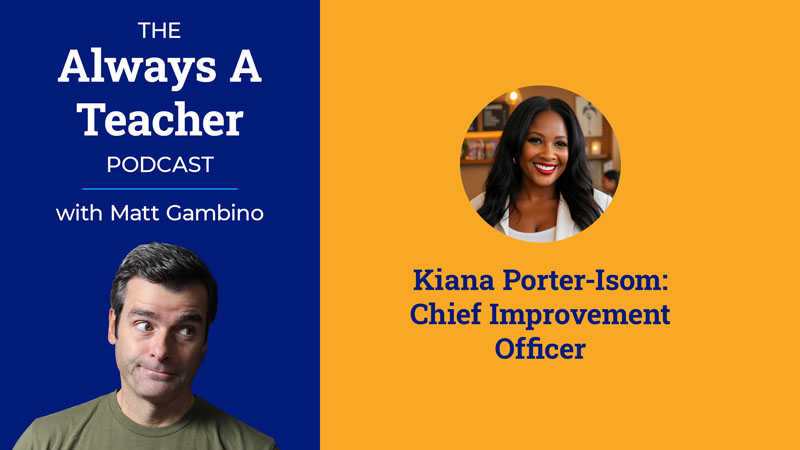Shoot Your Shot: A Teacher’s Guide to Solving Problems and Building a Career

Show Notes
In this episode, I sit down with Kiana Porter-Isom, a former middle school math teacher and curriculum developer who is now the Chief Improvement Officer at Reading Horizons. Kiana's title is one of the best I've ever heard, and her definition is simple: "I make things inherently better."
Kiana shares her incredible journey, including her unconventional move from a math-focused company to a literacy one, all to follow a "phenomenal leader." We talk about her "inherent desire to solve problems" as the driving force in her career, how she reframes her identity to take on new challenges, and why she believes all teachers have a "superpower" they might not even realize. This conversation is packed with Kiana's favorite, practical advice for any teacher wondering, "What's next?"
- The Chief Improvement Officer: Kiana explains her unique role, which focuses on systems, operations, data analytics, and company-wide AI strategy—all to "make the engine of the company run better."
- From Math to Literacy: Kiana discusses her transition from a math company she loved to a literacy company. The move wasn't about the subject matter; it was about the opportunity to work again with a "phenomenal leader" she admired.
- The "Problem-Solver" Mindset: Kiana's career path has been guided by an "inherent desire to solve problems." She explains how she was always looking for the next role that would allow her to fix the issues she was currently seeing.
- "Start Where You Are": Kiana's favorite piece of advice for teachers. She shares a practical exercise: make a list of every brand, software, and tool you use in your classroom and start researching those companies.
- "Shoot Your Shot": Kiana's story proves the power of being audacious. She explains why teachers should "shoot their shot" and cold-email people at companies they admire—it's exactly how she landed the connection that defined her career.
Episode Article
What does a "Chief Improvement Officer" do? When I asked my guest, Kiana Porter-Isom, she had the perfect answer: "I like to believe I make things inherently better." It’s a mission that has defined her entire career, from her days as a middle school math teacher to her current executive role at the literacy company Reading Horizons.
Kiana's story is a powerful lesson in following great leadership and betting on your own ability to learn. What makes her journey so interesting is that she was a *math* teacher who loved her job at a *math* company. She never expected to leave. But when a "phenomenal leader" she deeply admired moved to a new organization, Kiana took a leap. It was a leap that began with a single, audacious cold email she had sent years before, which led to a project, and eventually a career. Kiana's story is a testament to the idea that the right people and the right culture can be more important than the subject matter you know best.
This "problem-solver" DNA is at the core of Kiana's advice for teachers. She explains that her career wasn't a traditional "transition" but rather a series of fixes. "My thinking was always, 'Okay, what is the job I need to do next to be able to fix the set of issues I am experiencing now?'" This, she believes, is a superpower that teachers exercise every single day. "As a classroom teacher," she says, "there was a new problem to solve every day. And when the problem was not new, I couldn't always apply the same solution as the last time." That ability to adapt, learn on the fly, and "over-function" is exactly what edtech companies need.
For teachers who are curious about what's next, Kiana offers a brilliant piece of practical advice: "Start where you are." She suggests taking a week or two to "make a list of every brand, company, product, tool that you use in your classroom." From your computer to your software to the posters on your wall, "those things are created by a brand... and those brands and those companies usually, really appreciate the value that teachers bring." From there, get curious. Look up their websites, learn about their missions, and see what kinds of roles they have.
The next step? Be "a little bit more audacious." Kiana is a huge proponent of "shooting your shot" and reaching out directly to people at companies you're interested in, even if there's no job posted. "That is exactly how I connected with this amazing boss," she says. "I just sent her an email introducing myself." It's not about arrogance; it's about being clear on the value you can add. Teachers often struggle to separate their *identity* from their *role*, but Kiana urges them to see all the other skills they have: leading meetings, working with parents, managing complex projects, and creative problem-solving.
Kiana's final reminder is one of patience. This isn't a "get a job in 30 days" promise. "This is a process," she agrees. "It will unfold over time. But there are seeds that you can plant to get that process started." Her journey is the perfect blueprint for how to plant those seeds, nurture them with curiosity, and find the courage to shoot your shot.
